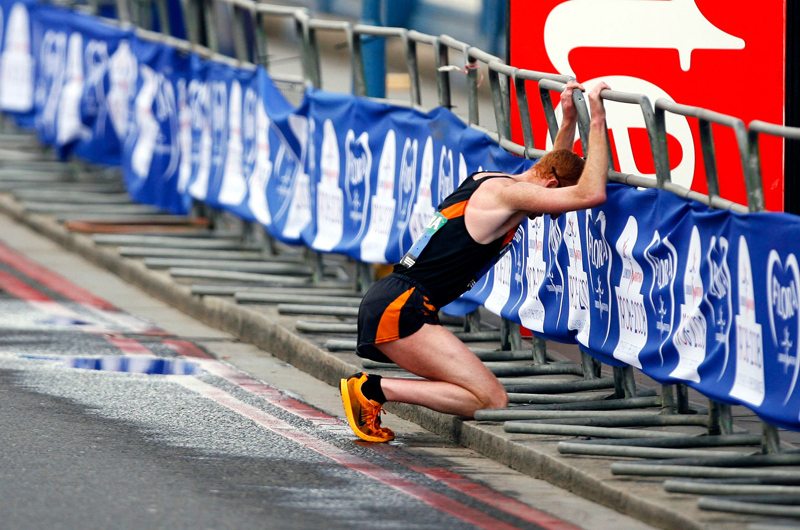When ignorance is bliss: the downside of clock watching

It’s well recognised that your mental state during exercise can affect performance – witness the growing popularity of using music before and during competition. However, it seems the human brain has even more influence on physical performance that we first though because some research has suggested that simply knowing about the magnitude of the task ahead can affect the amount of exertion you will perceive. For example, all cyclists will be familiar of the increased feelings of fatigue that are often experienced as a 100ming hill in the distance that must be climbed is spotted. Likewise, get a runner on a treadmill, tell them that they need to complete a 10km run. Now tell them halfway through the run that the original instruction was incorrect, and they now have to run 20km, and watch how they suddenly report an increased in perceived fatigue ! In a similar vein, quite recent research has suggested that knowing or not knowing how much time is remaining during an exercise task can significantly affect the body's physical responses during that exercise.
Don't tell the cyclists!
In one study designed to investigate this phenomenon, researchers studied the physiological and psychological effects of either giving or withholding information on remaining time during a session of repeated easy-hard intervals(1). To do this, ten well-trained males were recruited and asked to perform an exercise trial on a stationary bike. This consisted of repeated intervals of cycling for four minutes at low-intensity (50% of peak power output) followed by one minute at very high intensity (100% of peak power). The 4 minutes easy/1 minute hard cycling task was maintained continuously for 40 minutes (ie 8 repetitions in all). The trial was completed on 3 separate occasions, in each of which the cyclists were given different information on the time remaining:- No information on remaining time – ie the cyclists had no idea how long they’d be cycling for.
- Information on remaining time available constantly – ie the cyclists knew it was a 40-minute task and also knew exactly how much time cycling time was remaining.
- No information on remaining time until 20 minutes into the task when they were given the information.
Less info, more efficiency?
The key finding was that when the cyclists performed the trial with no information on the time remaining (trial 1), they used less oxygen than when they were given that information (trial 2), despite working at exactly the same intensity in both trials. And in the trial when they were given the info halfway through (trial 3), they used less oxygen only in the first half of the trial (ie when they didn’t have time remaining info) compared to the second half of the trial. It was also apparent that when the cyclists didn’t have any info on time remaining, they exhibited lower levels of electrical activity in their leg muscles compared to when they did.Fooling the governor
What are the implications of these findings for endurance athletes? Well, the most likely explanation for the differences in the trials above was that when the cyclists didn’t have any time remaining info, their muscles were somehow able to contract more efficiently. This would account for the lower levels of electrical activity and oxygen consumption, even though the workload was exactly the same as in other trials. On the face of it, it seems extraordinary that simply not knowing how long you’ll be exercising can result in improved muscle efficiency. However, this isn’t as far-fetched as it seems; the central governor theory of fatigue suggests that the regulation of muscle function is under far more control from the brain than we once thought – witness how caffeine and music can both lower perceived exertion(2-4). A key tenet of the central governor theory is that the brain will always regulate muscle function in a way to conserve sufficient energy. So it may be that when you don’t know how long you’re going to be exercising for, your brain (in an effort to conserve energy) is able to adopt more efficient motor firing patterns in the working muscles, which saves energy.In terms of practical implications, these findings suggest that clock watching during a race or training session might not be conducive to maximising efficiency and performance! That doesn't mean abandoning all pacing feedback; however, it may be that athletes who are able to develop a good sense of pace judgement early on in a race can relax more, thereby improving muscle efficiency and saving energy for the final push, which is often where races are won and lost!
References
- J Sports Med Phys Fitness. 2015 May;55(5):439-45
- Am J Physiol Regul Integr Comp Physiol 284: R399-R404, 2003
- Percept & Motor Skills 83, 1347-1352, 1996
- J of Sport Behavior 20, 54-68, 1997
You need to be logged in to continue reading.
Please register for limited access or take a 30-day risk-free trial of Sports Performance Bulletin to experience the full benefits of a subscription. TAKE A RISK-FREE TRIAL
TAKE A RISK-FREE TRIAL
Newsletter Sign Up
Testimonials
Dr. Alexandra Fandetti-Robin, Back & Body Chiropractic
Elspeth Cowell MSCh DpodM SRCh HCPC reg
William Hunter, Nuffield Health
Newsletter Sign Up
Coaches Testimonials
Dr. Alexandra Fandetti-Robin, Back & Body Chiropractic
Elspeth Cowell MSCh DpodM SRCh HCPC reg
William Hunter, Nuffield Health
Keep up with latest sports science research and apply it to maximize performance
Today you have the chance to join a group of athletes, and sports coaches/trainers who all have something special in common...
They use the latest research to improve performance for themselves and their clients - both athletes and sports teams - with help from global specialists in the fields of sports science, sports medicine and sports psychology.
They do this by reading Sports Performance Bulletin, an easy-to-digest but serious-minded journal dedicated to high performance sports. SPB offers a wealth of information and insight into the latest research, in an easily-accessible and understood format, along with a wealth of practical recommendations.
*includes 3 coaching manuals
Get Inspired
All the latest techniques and approaches
Sports Performance Bulletin helps dedicated endurance athletes improve their performance. Sense-checking the latest sports science research, and sourcing evidence and case studies to support findings, Sports Performance Bulletin turns proven insights into easily digestible practical advice. Supporting athletes, coaches and professionals who wish to ensure their guidance and programmes are kept right up to date and based on credible science.









